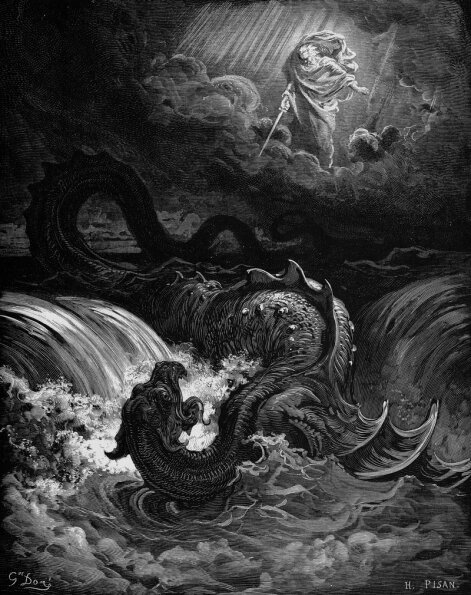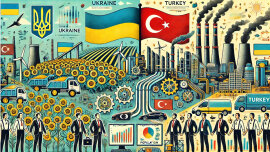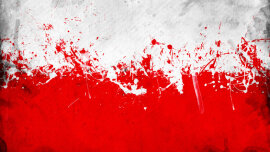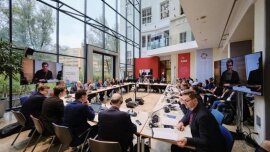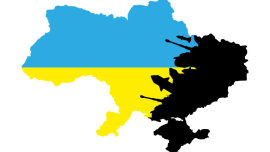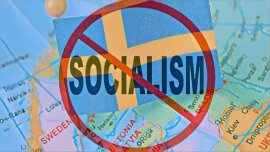Two months of war have shown who can fight it, how and with what tools. It has shown the available resources and internal restrictions of the countries involved. This points to two areas where efforts can be seriously increased: domestic transformation in Ukraine and harsher sanctions Russia sanctions. The past eight years show that quick success in the first area is extremely challenging for Ukraine. Serious progress in the second area seems to be at arm’s length, however. It is only a matter of clear priorities.
Russia sanctions have been inconsistent until now. The countries that introduced them shaped their decisions by what they could do without serious losses for themselves rather than by what had to be done to stop the war by pushing Russia to withdraw its troops from Ukraine or helping Ukraine win. The overall goal of punishing Russia and weakening its economy was correct. But nobody seems to have projected the implications. When the sanctions and the response of Russia’s economy to them took shape (see Russia’s economy: The Leviathan was injured, but not killed), they showed that those sanctions were not exactly what Ukraine would like to see — the war goes on and people are still dying. Therefore, the sanctions should be revisited and revised. A strategy should be designed to turn the sanctions into an effective economic frontline of this war. In order to do this, the following three questions should be answered:
1. Why should the West engage in this war?
This is a strange question for those who are in Ukraine. But statements by many European politicians show that the answer is not obvious to everyone even if they are sympathetic towards Ukraine. They believe that this is not their war because developments in Ukraine have nothing to do with them for as long as they can live their normal life. They are wrong. This has to be explained to them in detail. Because their actions depend on this.
Firstly, Russia has destroyed global security by starting the war against Ukraine. Modern Europeans perceive security as a given. But their parents and grandparents could explain the great price and value of it if they were alive. Without the security accomplished after World War II, the era of rapid global growth that has led to the quality of life in the civilized world would have been impossible. There would be no computers, smartphones, lowcost airlines, sharing economy and other benefits of modern civilization. Without security, when someone constantly wants to stab you, there is fear that prevents creation, discovery and development. It prevents space exploration and reflection on ways to overcome the challenges faced by humanity.
This war might start a lost decade. Eastern European and Scandinavian countries have already lost their sense of security. This is enough to make the entire euroatlantic community start investing in defense budgets the resources that could otherwise be invested in improving the lives of their citizens. Economic development will pause for as long as the arms race lasts. In the worst-case scenario, the gun will fire. Before waiting to act, the West must look into the future and realize that inaction now will lead to an oversized growth of overall spending in the future. Security of the world should be restored as soon as possible.
Secondly, by starting this war, Russia has violated the international rules-based order that emerged after World War II. It has violated the principle of equal rights and self-determination of peoples recorded in Article 1 of the UN Charter. According to this principle, dozens of countries that used to be colonies obtained independence after World Wars I and II. History has shown that this was the right decision as it helped improve global security; some of the former colonies stormed into the cohort of developed countries, while others mostly live much better than they did before World War II. Russia’s actions have crushed the right to self-determination of peoples, disregarded the UN Charter and the UN as an organization established as a pillar of the new international order after World War II.
If Russia accomplishes success in its aggression, this will ultimately bury the current international order. This will mean that the big can infringe on the small whenever they feel like, while the small will never feel safe and will lose hope of development. This will lead to an extremely dangerous precedent that will push the world closer to chaos. This is a problem for generations, not just decades. China will be the first to benefit from this precedent. The West must realize that China is watching what is going on very closely. Whatever Russia is doing now, China can replicate tomorrow if it sees that it can benefit from doing so. If the West tries to minimize its costs now, it will have to pay much more tomorrow. Paradoxically, it is impossible to stop the Kremlin without the euroatlantic community. Therefore, it will be responsible if this war grows into a global catastrophe.
Thirdly, if anyone in the civilized world still thinks in terms of orbits of influence, they have reasons to fear. If Russia seeks to restore its spheres of influence by attacking Ukraine, we should remember that it used to cover many countries that are now part of NATO. They will be next: if Russia takes over Ukraine now, its appetite for new conquests will grow. This is the conclusion of basic reasoning along the pattern that consists of Transnistria, Abkhazia, South Ossetia, Crimea and LNR/DNR. Unless the Kremlin is stopped in Ukraine, it will have to be stopped farther westward. This will require fighting. And this is a loss of not just the money that is so carefully counted in the West now. This is a loss of human lives which seem to be priceless there.
Fourth, Russia’s war against Ukraine is a revolt of authoritarianism against democracy. Putin never got Ukraine’s democracy. To him, this is an alien concept which he wants to destroy. This is not just about Ukraine. After the lengthy recovery from the global 2008-2009 crisis, the democratic world faced a wave of populism that led to the talk of the death of democracy and decay of the West. Now, democracy has been challenged directly. If it loses, authoritarianism will be considered more effective. The third countries that are still undecided are watching this clash carefully. A defeat of democracy could result in thriving authoritarianism and totalitarianism, and the suffering of millions across the world. The result for the West will be an inflow of refugees, piling new global humanitarian problems and a lack of opportunity to think of any development.
Fifth, Russia’s war against Ukraine is already costly for the West, and the West has lost peace as it faces a range of organizational, humanitarian and financial problems. Hundreds of billions will have to be spent on restoring Ukraine, and this number is growing exponentially. Unless action is taken today, this will last endlessly long. Some think that the civilized world will grow tired at one point and might refuse to spend money on supporting Ukraine. But then Russia will swallow Ukraine, become stronger and more confident, and will threaten the next victims. Therefore, there is no way back. The West should support Ukraine in any way it can, and then help rebuild a strong outpost of democracy here so that it does not lose far more if Russia won.
Therefore, it is not just about European values that to many in Europe and America can unfortunately sound abstract and unconvincing. If the current trends launched by Russia’s invasion of Ukraine – and even earlier – are extrapolated, the lifestyle that the West has grown accustomed to over the decades of peace will soon be ruined like a house of cards. Russia is threatening it. Therefore, this is the war of the whole civilized world. If the West does not want to stop its development, fight on its territory, allow the world to tumble into chaos and the right of the strong to return, or watch a global rise of authoritarianism, it will have to act. It is better to do everything necessary now to stop the war and avoid a lost decade or generation than to pay a way higher price in the future. Some countries seem to realize this. All should realize this.
2. How can Russia be stopped
In order to effectively resist Russia, we need to understand the pattern of its actions. The civilized world seems to always have had some difficulties understanding it. Russia’s line of conduct is similar to that of a bully, insecure and hollow internally. Here are the factors that illustrate this.
Several observations illustrate the internal hollowness and disharmony. The first one is the messy lifestyle of millions of Russians as manifested in untidy homes as a social norm – while the wealthier Russians have a very bad taste crowding up their interior with things, styles and forms; inappropriate behavior abroad, especially where more Russian citizens live or get together; and now in the routine of Russians soldiers in Ukraine. This is a case in point where mentality defines being as a projection of internal hollowness. The latter expands to anything that gets under the Kremlin’s control, from the GDR and East Germany – or even before – to Crimea and LNR/DNR.
Over decades or centuries, Russia has been trying to plug this internal hole with something it steals from others. No beautiful[1] history of its own? They try to steal it from Ukraine. Nobody else in the world is holding on to history so hard because they have enough problems in the present. No accomplishments domestically? They try to get them outside, at the expense of Moldova, Georgia, Ukraine and the rest of the world. By contrast, others in the world tend to focus on domestic accomplishments and development. No past grandeur? They try to return the past. Even if the greatest countries are rarely obsessed with their grandeur. Domestic transformation is the only way to fill the internal hollowness. Russia does not have any. As a result, it keeps looking for something that could cover it up, even if temporarily.
In the early 2000s, the West offered the Kremlin cooperation and peaceful coexistence that benefits both. The idea was that this would make Russia better-off and more civilized. This makes sense: a normal human being follows up Maslow’s hierarchy after satisfying their basic needs. This has not worked for Russia as its internal hollowness stands in the way. Moscow happily embraced the generous oil and gas dollars and, instead of using this money to develop the country and the population, it invested in building a network of agents, corrupting Western officials, and strengthening its army and propaganda to replicate this hollowness.
Russia will not recover from this sense of hollowness until it accepts itself as it is. The history of empires shows that this is impossible without cleansing through a profound defeat, humiliation, poverty and possibly loss of territory. For as long as this sense of hollowness continues, the Kremlin will continue its destructive influences on the world. Because these are just its attempts to vent what has accumulated inside.
Secondly, Russia is profoundly reactive, not proactive in essence. It does not generate any new senses, just mimics what others invented. The EuroMaidan in Ukraine? They organize anti-Maidan and KGB-style maidans in eight oblasts in Eastern and Southern Ukraine. The right to self-determination for Ukraine? Then the “peoples of Ukraine” have the same right. Democracy in Ukraine? Here you go with “people’s republics”, “people’s army”, and an “anti-people regime” in Kyiv. You are rescuing refugees? Then Russia will “rescue” refugees, even if against their will. You have volunteers? Then Russia will manufacture a grotesque volunteer movement. The Americans have Silicon Valley? Then Russia will mimic it with Skolkovo. This list is far from over.
Reaction is always a response to action. Therefore, Russia needs someone to act. Preferably, someone big because a smaller actor will not be a sufficient irritant. Hence Putin’s permanent urge to meet with Biden and talk to the US even if the war is with Ukraine; or to receive the leaders of France, Germany, China and give them his nonsense. This feeds Russia’s illusory sense of grandeur. On the one hand, this is a way to build its self-affirmation and fill in the hollowness temporarily. On the other hand, this is a tool of self-motivation to push itself out of its existential decay.
Russia constantly feeds its confidence at the expense of others. Just like a bully provokes to grow his confidence at their expense, Russia subverses, bribes and uses other tricks, or simply bothers people – always and everywhere. This helps Russia forget about its hollowness for a short time as it plunges into the fleeting and drunkening sense of pleasure from the damage it creates. However, it does not help Russia fill in its hollowness.
Russia has perfected this reactiveness. It feeds on the actions, fears and doubts of others. It disdains any insecurity, feet-dragging, fear, indecisiveness, half-tones, middle-ground positions and ambiguous actions. It needs action and decisiveness. Otherwise it cannot react with full force and declines. Hence its disdain for democracy, the West and anything related to it. Because they are ambiguous by definition.
Russia is therefore a geopolitical bully. It picks on others to fill its internal hollowness and provokes so that their reaction mobilizes it, motivates its aggression and “justifies” this expression. Ignoring it is the worst response. When bullies are ignored, they get into a corner and get drunk till oblivion. Otherwise, their internal hollowness will tear their mind apart. As soon as the bully is kicked out of the spotlight, he vanishes into oblivion.
An alternative response to a bully is to punch it so hard that it loses its urge to pick on people again. Fear of another punch will keep him at bay. There is one detail about this. A bully is either afraid or disdains others – a popular phrase in Russia is “fear means respect” – there is no third option. As long as he is afraid, this will motivate him to become stronger in order to pay revenge. This means that he should be kept in fear forever, or we will always have to prepare for a new round of the clash. So, ignoring is better.
3. What are the most effective instruments to stop Russia?
The West cannot avoid acting. Otherwise, things will get worse eventually. It is better to act now because the losses will be far greater in the future. It is better to hit in a concentrated manner now to get a result fast instead of tightening the screws gradually by mobilizing Russia and allowing it an opportunity and time to respond. Any half-measures will diminish the ultimate effect. The philosophy of the sanctions should be to couple the fullest ignoring possible and a maximum punch where Russia has no resources to respond catastrophically. The West must be united and effective so that its actions are convincing and to avoid side effects from third countries. Structured into specific instruments, this philosophy is implementable with the following points:
1. Isolate Russia as much as possible. This includes expelling it from all organizations of international cooperation, breaking any ties in the diplomatic, political, economic, social and other fronts, and deporting all Russian citizens from the developed world.
2. Russia will look for ways to bypass the sanctions and is likely to do so with bribing. The inflow of currency should thus be stopped to Russia. The best option is full embargo of trade with Russia. It is better for the developed economies to go through a price shock from restricted supply once while clearly signaling to businesses that they need to adjust to the new harsh reality – and the businesses will find solutions quickly – than to generate uncertainty with half-measures.
3. A minimal agenda is to bring down to or below zero the current account balance (currency inflow is already blocked on the financial account). Russia’s current account balance was USD 122bn in 2021. Its exports amounted to USD 550bn, with the US and Europe accounting for a third. This means that it should only shrink by 22%, although the actual number is somewhat higher as imports will tumble in 2022 and the price of fuels as the key export item will grow. This is not an extremely complex task. High import duty will send the right signal to the market while not leaving the developed economies without critical products.
Russia’s export of fuels, including oil, oil products, natural gas and NLG was USD 244bn in 2021. Halving it – or cutting it down somewhat more given the current market – would bring the necessary effect. Apart from physical supplies, prices can be pushed down with a sharp increase of supply in the world. This would be a top-notch solution. Apart from the fuels, Russia exported other goods at USD 306bn. This offers a wide range of opportunities as well. The problem is that this is a list of thousands of items that are much harder to control compared to fuels. The West’s bureaucracy is capable of dealing with such a task. In order to accomplish the goal, it is not necessary for everyone to quit Russian fuels. But these tactics will fuel Russia’s reaction and allow it room for maneuver.
If the inflow of currency to Russia is stopped, this will exclude it from geopolitical processes and bring it down to a different level of problems. Russia will lose its global agent network as it will not have enough sources to fund it. It will not have money to buy the likes of Gerhard Schroeder.
4. Turning Russia off from SWIFT or transport blockade essentially duplicate the effect of trade restrictions although they can make this effect more rapid. Overall, such instruments can be used but they are less precise. Still, they should also be considered as an element of general isolation of Russia. Blocking Russia’s entire border with EU member-states will force it to completely overhaul the logistics of all processes. This will cause huge losses for Russia. This can be done regardless of quitting its fuels.
5. Exit of international businesses from Russia. Over 750 foreign companies have stated that they are leaving Russia by now. What influenced their decisions – their values, legal restrictions or a risk of losing the clients in developed markets that are sympathetic with Ukraine – is not clear so far. Even if Russia manages to keep part of its foreign trade, the West should quit any prospects of cooperation other than the ones that are strictly regulated. Businesses must realize this – through government communications that confirm the decisiveness of the states, or through public response.
6. The unity of the civilized world in countering Russia is extremely important. It helps spread the negative economic impact among many countries while Russia will face it alone and on its own. If the West stands united, it can divide the quotas for Russian exports in line with the critical needs, or it can differentiate import taxes based on the priorities of individual economies. Finally, EU countries can unite into one buyer of Russian oil and gas, then divide it in line with the priority needs. The West’s unity will define the ultimate position of China that could side with it – as it did when Henry Kissinger was young. The thing is that China is trying to keep a balance and take a shortcut to that balance. When the clash was just about Ukraine and Russia, Beijing called for respecting Russia’s demands. When the West takes a decisive and firm stance, China will believe that complying with the West’s demands is the key condition for recovering the balance.
7. Unconventional instruments. For example, relying on the Federal Reserve. If commodity prices remain high, China’s economy will suffer the most. 2021 showed that China cannot transfer high import inflation to domestic consumers. This leads to problems with the profitability and liquidity of businesses, including businesses with loans. Time plays against China. If the unity of the West and full isolation of Russia push commodity prices farther up, China will be forced to pressure Russia into taking into consideration the West’s demands. If the prospects of the global economy sour, commodity prices will plummet – so will the inflow of revenues in foreign currencies to Russia. To ensure the first scenario, the Federal Reserve should keep the interest rate unchanged. To ensure the second scenario, it should raise it sharply. This means that the Federal Reserve can act in line with the West’s needs. Support from the European Central Bank will contribute to a full impact.
In sum, the system of Russia sanctions should pursue two objectives. First, cut down the inflow of foreign currency to Russia to a zero or below. This will make sure that Russia is helpless on the international arena and economic problems pile up inside. Second, any contacts with the Russians should be toxic by default. This ensures global embarrassment similar to the one that helped cleanse the Germans from Nazism after World War II. Russia will not cure from its imperial insecurities until it goes through poverty and disgrace. The civilized world is obliged to help it in this.
